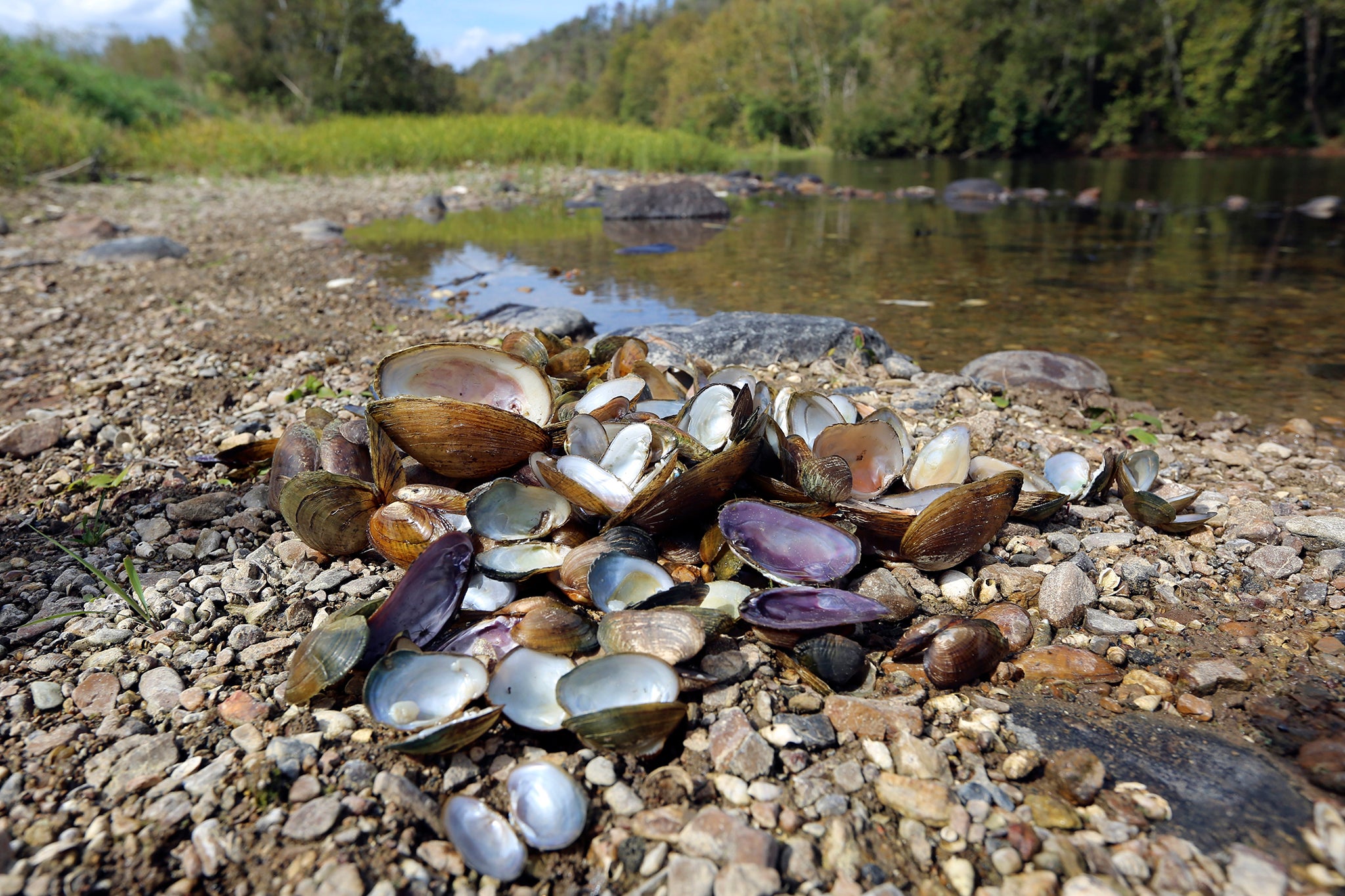Could 'mussel-bola' explain the mass die-offs of freshwater mussels?
Some 80,000 mussels died in a 200-metre stretch of the Clinch River, Virginia over a two-year period, according to the study

The mystery as to why tens of thousands of freshwater mussels are dying may be one step closer to being solved. And the cause could be a novel virus, dubbed “mussel-bola”.
An astonishing 70 per cent of mussels in the US are extinct or at risk, according to the US Fish and Wildlife Service (USFWS). By comparison, around 17 per cent of mammals and 15 per cent of bird species are imperiled.
Mussels are the little-noticed powerhouses of their ecosystems – cycling nutrients for species that live on the bottom and acting like tiny “Brita filters” by detoxifying contaminants from freshwater supplies.
They also stabilise and oxygenate riverbeds, and once they die, their shells are taken as homes by other species. Some species of mussel can live up to 100 years.
“Mussels have been in trouble for a long time,” Jordan Richard, a USFWS biologist, and PhD student with the freshwater and marine sciences program at the University of Wisconsin-Madison, told The Independent. The threats posed include climate change, pollution and the damming of rivers.
But biologists became alarmed when, in 2016, they discovered that mussels were dying in the tens of thousands in a particularly biodiversity-rich hotspot for the species, the Clinch River, which runs from Virginia into Tennessee.
Mr Richard noted that although there is a lack of population data on mussels generally, what happened in the Clinch coincided with long-term monitoring projects.
In one species, the Pheasantshell, population numbers were decimated. “We saw 80,000 mussels die in a 200-metre stretch over a period of about two years,” the biologist said.
The die-offs might have gone undetected without the monitoring projects.
“It’s not like the mussels are all fine on Monday and then by Wednesday there are 80,000 dead bodies,” Mr Richard said, noting that the species tend to die seasonally and usually are buried into the riverbed when they do.
“It’s not that dramatic, which is problematic. It’s one of those things about sampling cryptic species - for every one you find, there’s ten, a hundred or a thousand that you don't see.”
Mr Richard was involved in the study, published this month in Scientific Reports, which is trying to figure out what is going on.
The research team looked at 58 Pheasantshell mussels, both healthy and diseased, from the Clinch River using “metagenomics”, the study of genetic material recovered directly from environmental samples.
In all, the blood of Pheasantshells contained 17 viruses. But only one, a novel densovirus, was linked to morbidity.
"Clinch densovirus 1", as it has been named for the time being, was 11 times more likely to be found in sick mussels than healthy ones, according to the paper.
It was dubbed “Mussel-bola” by the New York Times. While Mr Richard noted that the researchers didn’t use the term as “scientists don’t like to overdramatise things”, it was useful to help the public understand what was happening, and its significance.
“It conveys the message of the possibility that a virus or a particular disease organism is causing death to hundreds, or possibly thousands, of animals in a time-span,” he said.
The biologist also noted that the coronavirus pandemic had significantly raised the level of public awareness when it came to interest and understanding of viruses. “Unfortunately everyone has had a primer in 2020,” he said.
It is very unlikely that a densovirus would be harmful to humans, Mr Richard said, as the whole class of viruses do not affect vertebrates.
However “densoviruses cause lethal epidemic disease in invertebrates, including shrimp, cockroaches, crickets, moths, crayfish, and sea stars,” the researchers noted.
Mr Richard also strongly advised against eating freshwater mussels which are far from the delicacy of their marine cousins.
“With their long lifespan and all the useful functions they perform, there’s a lot of toxins in freshwater mussels that you wouldn’t want to eat,” he said.
“They are very tough, like balls of rubber. People use them as fishing bait. I once saw someone catch 20 catfish with the same mussel.”
The study’s findings are not conclusive but it does place the virus on the shortlist of suspects as to what is killing off the mussels.
If not a direct cause of death, the scientists noted that “Clinch densovirus 1” could be interacting with other “biological and ecological stressors” such as bacteria, invasive species or increased water temperatures.
A report last year found that climate change is playing a role in warming freshwater systems like lakes, rivers and streams, along with oceans.
Controlled lab testing on the densovirus is next, where it will be cross-referenced with other factors, particularly the effects of temperature.
“We’re putting together a lab as we speak,” Mr Richard said. “Just like Covid-19 has its underlying factors, there will be all sorts of other associations. For example, does it affect other species? Does temperature play a role in how lethal it is?”
If it’s proven that there is a viral cause for mass mortality in mussels, a rapid test could be developed. “To do something for the conservation of mussels, we have to know what’s causing it,” the biologist said.
Join our commenting forum
Join thought-provoking conversations, follow other Independent readers and see their replies
Comments


Bookmark popover
Removed from bookmarks